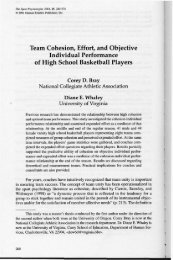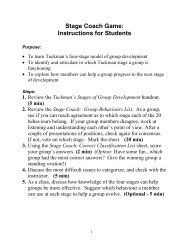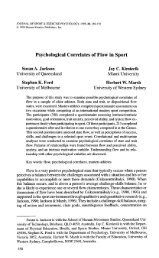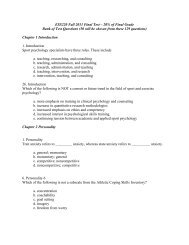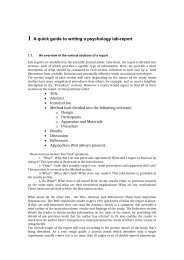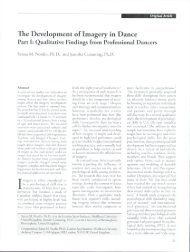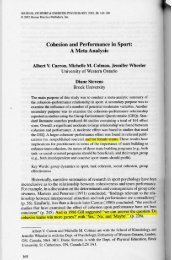Sport and Exercise Psychology Review - Sport Psychology Goes to ...
Sport and Exercise Psychology Review - Sport Psychology Goes to ...
Sport and Exercise Psychology Review - Sport Psychology Goes to ...
You also want an ePaper? Increase the reach of your titles
YUMPU automatically turns print PDFs into web optimized ePapers that Google loves.
Mark B. Andersen<br />
While I continue <strong>to</strong> keep this Oath unviolated,<br />
may it be granted me <strong>to</strong> enjoy life <strong>and</strong> the practice<br />
of the art, respected by all men, in all times.<br />
But should I trespass <strong>and</strong> violate this Oath,<br />
may the reverse be my lot.<br />
The issue of confidentiality is the last item in<br />
the Hippocratic Oath <strong>and</strong> is immediately followed<br />
by the two sentences I have added <strong>to</strong><br />
the usually cited passage. These two sentences<br />
are beautiful end punctuations <strong>to</strong><br />
how serious Hippocrates believed these st<strong>and</strong>ards<br />
of practice <strong>to</strong> be. He essentially finishes<br />
off the Oath with ‘If I violate these laws<br />
of practice (e.g. doing no harm, confidentiality,<br />
no sexual intimacy with patients),<br />
then I should be damned.’ Hippocrates, like<br />
Darwin <strong>and</strong> Freud, <strong>to</strong> me, have near god-like<br />
stature. The rest of us, however, are mere<br />
mortals <strong>and</strong> subject <strong>to</strong> human – all-<strong>to</strong>ohuman<br />
– responses <strong>to</strong> clients, media, <strong>and</strong><br />
our own needs <strong>and</strong> desires. The world does<br />
not need <strong>to</strong> know that David Beckham <strong>and</strong><br />
any psychologist have a professional relationship,<br />
<strong>and</strong> giving the world that information<br />
does nothing <strong>to</strong> help David Beckham,<br />
violates the terri<strong>to</strong>ry of confidentiality, <strong>and</strong><br />
serves the psychologist through possibly<br />
increasing credibility, perhaps satisfying selfaggr<strong>and</strong>ising<br />
narcissistic needs, <strong>and</strong> maybe<br />
even helping secure some future financial<br />
gain. Many breaches of confidentiality in<br />
(sport) psychology service are actually subtle<br />
forms of exploitation.<br />
The ethical principle of confidentiality is<br />
the foundation upon which a viable <strong>and</strong><br />
healthy working alliance is formed. Clients<br />
need <strong>to</strong> feel safe <strong>and</strong> secure in disclosing<br />
anything <strong>to</strong> their psychologists. If they do<br />
not, then trust <strong>and</strong> respect cannot develop,<br />
important material may not emerge, <strong>and</strong><br />
therapy or counselling will probably be relatively<br />
ineffective. Confidentiality is embedded<br />
in the warp <strong>and</strong> weft of the therapeutic<br />
relationship fabric, <strong>and</strong> it st<strong>and</strong>s along with<br />
respect for human dignity <strong>and</strong> freedom,<br />
unconditional positive regard, <strong>and</strong> the creation<br />
of an environment free of threat (see<br />
Rogers, 1957). The message of confidentiality<br />
informs the client that whatever is said<br />
(with a couple extreme exceptions) the<br />
information will be treated with respect, the<br />
right <strong>to</strong> privacy will hold (see previous section)<br />
<strong>and</strong> that one need not fear that secrets<br />
will be communicated <strong>to</strong> others. This threatfree<br />
<strong>and</strong> respectful environment supplies the<br />
basis of permission for the clients <strong>to</strong> be<br />
themselves, with their joys, fears, hopes,<br />
dreams, peccadillos, <strong>and</strong> warts <strong>and</strong> all. It also<br />
allows for the healthy development of positive<br />
transference <strong>and</strong> countertransference<br />
(cf. Andersen, 2005). Simply put, we can’t<br />
deliver service without it.<br />
Confidentiality <strong>and</strong> the identified client<br />
Confidentiality, at first, appears relatively<br />
straightforward, but it is not (see Kremer,<br />
2002). As sport psychologists, we are bound<br />
<strong>to</strong> keep the client’s confidence, but the<br />
questions arise: (a) who is the client? <strong>and</strong><br />
(b) what are the contractual obligations?<br />
In many cases, sport psychologists are<br />
employed by national governing bodies<br />
(NGB), by team administra<strong>to</strong>rs, by sports<br />
medicine groups, or by parents <strong>and</strong> not by<br />
individual athletes. A contract with an NGB<br />
implies certain obligations <strong>to</strong> that organisation.<br />
It may be that the sport psychologist is<br />
employed <strong>to</strong> figure out where things are<br />
going well for the athletes <strong>and</strong> coaches <strong>and</strong><br />
where they are not. Interviews <strong>and</strong> encounters<br />
with the athletes <strong>and</strong> coaches then need<br />
<strong>to</strong> be couched in terms of the sport psychologist<br />
being brought in <strong>to</strong> help the NGB create<br />
a more salubrious environment. This<br />
service is similar <strong>to</strong> the work of many organisational<br />
psychologists. A sport psychologist<br />
in this role would not specifically relate <strong>to</strong><br />
the NGB what individual athletes <strong>and</strong><br />
coaches had said, but would report on the<br />
general atmosphere of the team, what needs<br />
of coaches <strong>and</strong> athletes were being met,<br />
which needs were not being addressed, <strong>and</strong><br />
so forth. Individual confidentiality would be<br />
maintained, but general confidentiality<br />
would be waived. The psychologist would<br />
then make suggestions for changes, actions,<br />
or other interventions <strong>to</strong> help improve<br />
the sport for all involved. For an example<br />
6 <strong>Sport</strong> & <strong>Exercise</strong> <strong>Psychology</strong> <strong>Review</strong> Vol 1 No 2




